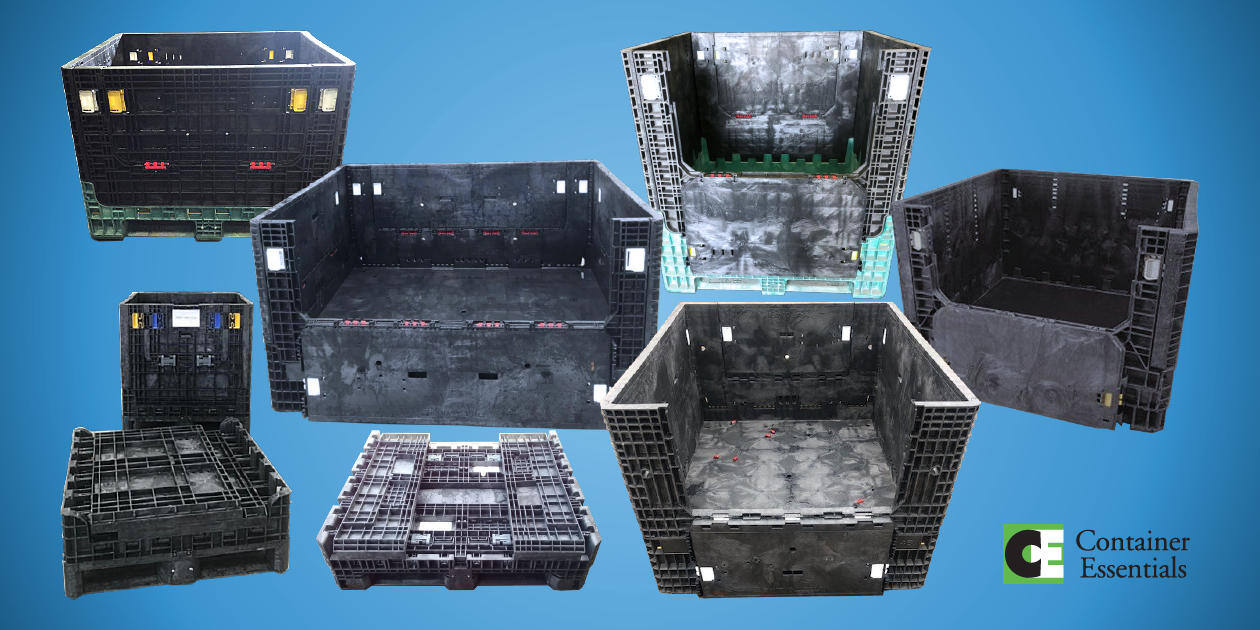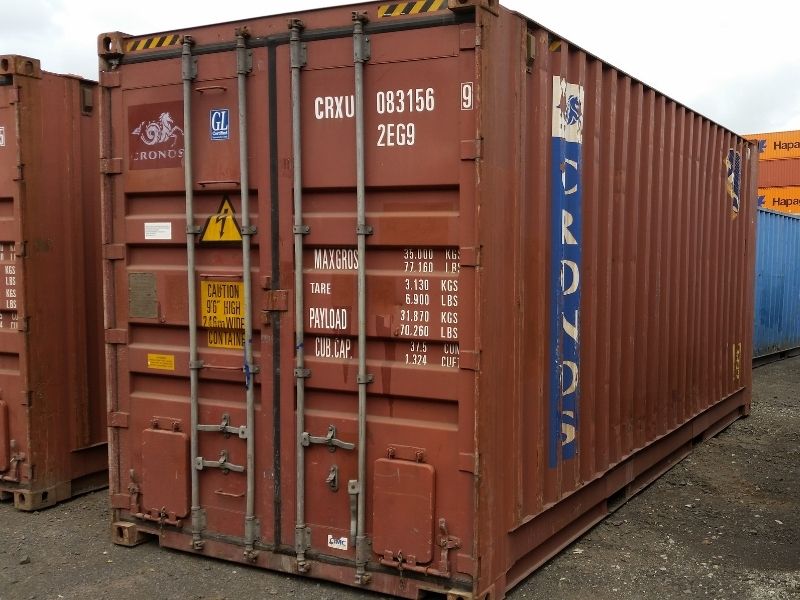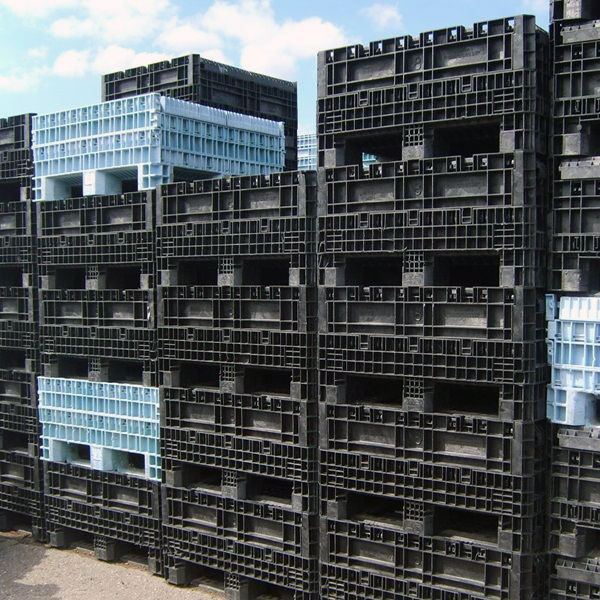Simplify logistics with used collapsible containers for better operations
Why Mass Containers Are Necessary for Sustainable and Cost-efficient Transport
Mass containers play an important role in contemporary logistics. They assist in the effective movement of big amounts of goods, thus enhancing transportation processes. This technique not just reduces expenses yet likewise minimizes ecological effect with lower emissions and waste generation. As sectors look for more lasting methods, the fostering of bulk containers is becoming significantly considerable. What effects does this change hold for future logistics and supply chain management?

The Advantages of Using Bulk Containers in Logistics
Mass containers change logistics by enhancing performance and sustainability. These containers permit the transport of large amounts of products in a solitary trip, noticeably minimizing the number of journeys needed. This not only improves procedures yet likewise decreases labor costs connected with handling, loading, and unloading. In enhancement, bulk containers are designed to maximize room application within transport lorries, making sure that more items can be delivered all at once.
The standardization of mass containers likewise streamlines the logistics process. With consistent dimensions, they can be quickly piled and stored, leading to boosted warehouse management. Furthermore, bulk containers typically feature long lasting products that safeguard materials from damages during transit, thus decreasing item loss and enhancing general dependability. Because of this, businesses can experience enhanced supply chain performance, eventually leading to increased earnings and consumer contentment. This combination of factors makes bulk containers a critical possession in modern logistics.
Ecological Effect: Decreasing Waste and Carbon Footprint
As markets increasingly focus on sustainability, the adoption of mass containers has actually emerged as a crucial strategy for minimizing waste and reducing carbon footprints. These containers lessen using product packaging products, such as boxes and plastic, thereby especially reducing general waste generation. By consolidating shipments, mass containers enhance transport performance, permitting even more items to be delivered per trip. This reduction in journeys directly correlates with lower greenhouse gas exhausts, contributing to a smaller carbon impact.
Mass containers can usually be reused or recycled, better minimizing ecological impact. The toughness of these containers warranties they can withstand several transport cycles, decreasing the need for single-use choices. used bulk containers. By improving logistics and promoting efficient source usage, bulk containers not only sustain lasting methods however likewise motivate industries to align with international environmental goals. Ultimately, their implementation mirrors a dedication to eco-friendly stewardship and accountable resource monitoring
Expense Cost Savings: Exactly How Bulk Containers Lower Transportation Expenses
While numerous firms look for methods to enhance their profits, the usage of bulk containers presents a considerable chance for reducing transport costs. Bulk containers maximize the quantity of products carried, allowing businesses to deliver larger quantities at the same time. This performance minimizes the number of journeys needed, directly decreasing fuel expenses and decreasing labor costs connected with loading and dumping.
Furthermore, bulk containers often include streamlined styles that optimize area usage within transport automobiles. This implies less voids, causing a lot more effective use available ability. The longevity of mass containers can reduce the threat of item damage during transportation, guaranteeing and reducing losses that even more items arrive undamaged.
Enhancing Supply Chain Performance With Bulk Storage Solutions
Mass storage space services play an important role in improving supply chain performance by optimizing inventory administration. By settling goods into fewer, larger containers, organizations can significantly lower handling costs linked with regular transfers and handling. This structured method permits for far better tracking and monitoring of stock, inevitably causing enhanced operational efficiency.
Streamlined Supply Monitoring
Effective inventory management is vital for enhancing supply chain procedures, especially when companies take on bulk storage space remedies. These remedies make it possible for organizations to keep greater supply levels while reducing the regularity of replenishment. By settling materials right into bulk containers, companies can enhance their supply processes, lowering the complexity connected with tracking several smaller plans. This strategy facilitates exact stock counts and boosts forecasting precision, permitting more enlightened decision-making. In enhancement, mass storage space options streamline storehouse company, making it less complicated to locate and access products when needed. As a result, organizations can accomplish a more reliable inventory turnover rate, ultimately boosting total supply chain efficiency and reducing the probability of stockouts or overstock scenarios.

Lowered Handling Prices
The execution of mass storage space services not only streamlines supply monitoring but likewise significantly reduces dealing with prices throughout the supply chain. By combining materials right into mass containers, companies decrease the need for regular handling and transfer between different storage and transport systems. This technique reduces labor expenses connected with loading, dumping, and relocating smaller bundles. Additionally, mass storage space reduces the frequency of shipments, bring about reduced transport prices and reduced gas usage. Consequently, businesses can optimize their logistics procedures, enabling for an extra reliable allotment of sources. Eventually, lowered taking care of expenses add to boosted total supply chain effectiveness, fostering an environment that sustains both sustainability and economic stability.

Adaptability of Bulk Containers Throughout Different Industries
Lots of markets have distinct needs for transportation and storage, bulk containers have emerged as a functional option that satisfies a large array of demands. These containers, varying from big containers to specialized containers, can fit diverse products, consisting of granules, liquids, and powders. In the farming industry, mass containers assist in the transportation of plant foods and grains, while the food and drink industry utilizes them for components and finished products. The chemical industry relies upon bulk containers for safely moving harmful products, making certain conformity with security policies. Furthermore, building firms take advantage of mass containers for transferring accumulations and other products. Their versatility encompasses different modes of transport, consisting of vehicles, trains, and ships, improving logistical performance. This versatility not just simplifies procedures across different sectors however also promotes sustainability by decreasing product packaging waste and enhancing room in transit. Bulk containers play an essential duty in contemporary supply chain monitoring.
Future Fads wholesale Container Usage and Sustainability
The future of bulk container usage is significantly formed by cutting-edge materials development that enhances sustainability. In addition, automation in logistics promises to enhance operations, lowering waste and boosting efficiency. Embracing round economic climate techniques will certainly better reinvent exactly how bulk containers are created, made use of, and reused, cultivating an extra sustainable transport landscape.
Innovative Products Growth
As industries progressively focus on sustainability, cutting-edge materials advancement in mass containers arises as a significant consider improving green transportation services. Scientists and manufacturers are discovering naturally degradable plastics, recycled composites, and light-weight metals to decrease environmental influence. These products not only decrease waste yet likewise enhance fuel performance by lowering the overall weight of containers. Furthermore, innovations in clever products, which can adapt to varying problems, enhance the sturdiness and capability of mass containers. The integration of these innovative materials straightens with circular economic climate principles, promoting reuse and recycling. As the need for lasting practices grows, the growth of such materials will certainly play a vital function in forming the future of mass container use in logistics and transport.
Automation in Logistics
Substantial developments in automation are positioned to transform logistics and the application of bulk containers, enhancing sustainability in transport. Automated systems, including drones and independent vehicles, are improving the activity of bulk containers, lowering the reliance on traditional fuel-powered transportation. These innovations optimize routing and loading procedures, boosting and lessening empty miles fuel efficiency. Furthermore, automated inventory administration systems enhance monitoring and monitoring of mass containers, ensuring far better source allocation and reduced waste. The combination of the Web of Things (IoT) permits real-time data analysis, making it possible for proactive decision-making that straightens with sustainability objectives. As automation continues to advance, it is anticipated to drive additionally innovations in mass container usage, ultimately sustaining more sustainable logistics methods and reducing the environmental effect of transport.
Round Economic Climate Practices
Advancements in automation are setting the stage for a much more integrated technique to circular economic situation methods in the domain name of bulk container usage. As sectors increasingly here accept sustainability, mass containers are being made for durability and reusability. This shift not just minimizes waste but likewise improves resource effectiveness. Companies are taking on strategies such as closed-loop systems, where used containers are collected, reconditioned, and reestablished into the supply chain. Furthermore, smart innovations track container life process, helping with much better administration and decreasing ecological impact. The cooperation between manufacturers, logistics service providers, and end-users is necessary in establishing standards for sustainable container usage. used collapsible containers. Future trends indicate a growing focus on products that are eco-friendly and recyclable, further strengthening the round economy's concepts wholesale transportation

Regularly Asked Concerns
What Materials Are Mass Containers Usually Made From?
Bulk containers are commonly constructed from long lasting products such as high-density polyethylene, aluminum, steel, and cardboard. These materials offer protection, stamina, and convenience, making them appropriate for moving different goods in different markets efficiently.
Exactly how Do I Choose the Right Size Bulk Container?
Picking the appropriate dimension bulk container entails evaluating the quantity of materials to be transported, taking into consideration handling equipment compatibility, and evaluating storage space requirements. Correct size guarantees efficiency in transport and minimizes waste throughout delivery.
Are Bulk Containers Reusable or Recyclable?
Mass containers are frequently recyclable, created for numerous trips, boosting sustainability. Many can likewise be reused, depending upon the materials made use of. Picking recyclable options additionally lowers and sustains ecological goals waste in transport techniques.
What Safety And Security Regulations Relate To Bulk Container Transportation?
Security policies for mass container transportation consist of conformity with the Department of Transport guidelines, correct labeling of unsafe products, structural integrity analyses, and adherence to weight limits to assure safe handling and protect against mishaps throughout transit.
Just How Can Companies Shift to Using Bulk Containers Successfully?
Companies can transform to bulk containers by evaluating current logistics, educating team on handling, buying ideal devices, enhancing inventory monitoring, and working together with suppliers to guarantee compatibility and performance throughout the supply chain.
As industries significantly prioritize sustainability, the fostering of bulk containers has arised as a key strategy for minimizing waste and lowering carbon impacts. By settling materials right into bulk containers, business can streamline their supply procedures, decreasing the intricacy linked with tracking several smaller sized bundles. As markets significantly focus on sustainability, ingenious products growth in bulk containers emerges as a considerable factor in boosting green transport options. Automated systems, including drones and independent vehicles, are simplifying the movement of mass containers, minimizing the dependence on standard fuel-powered transportation. Additionally, automated stock management systems enhance monitoring and tracking of bulk containers, making certain much better source allocation and minimized waste.